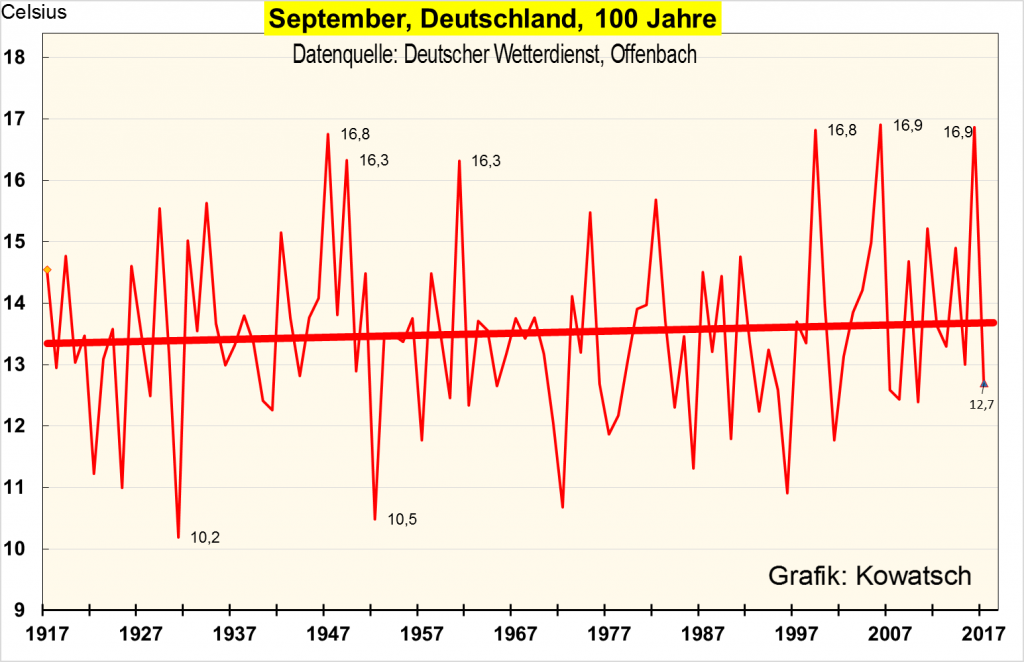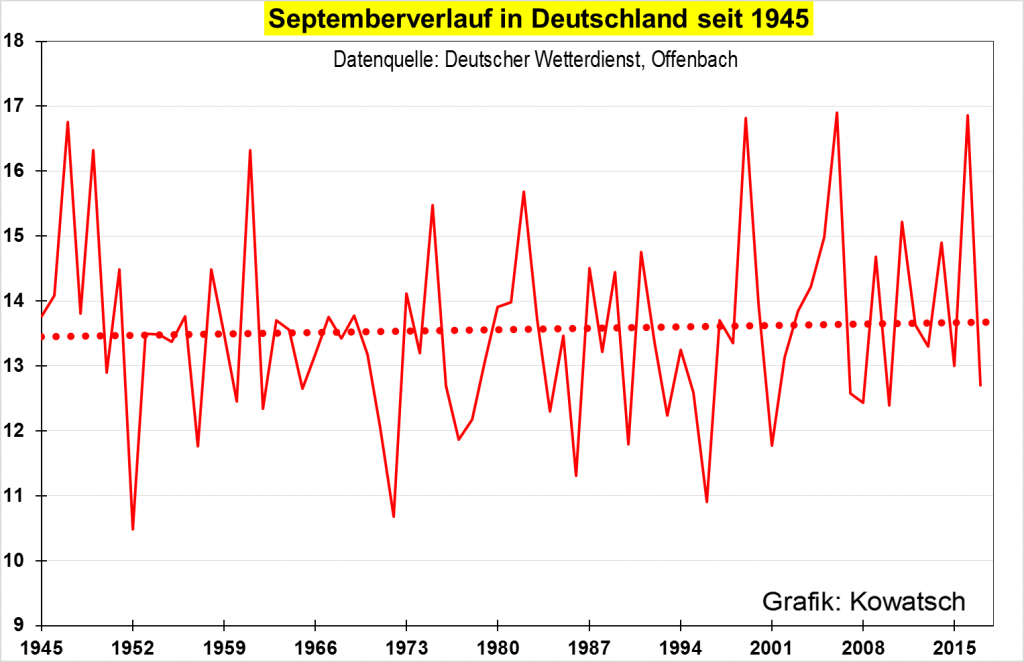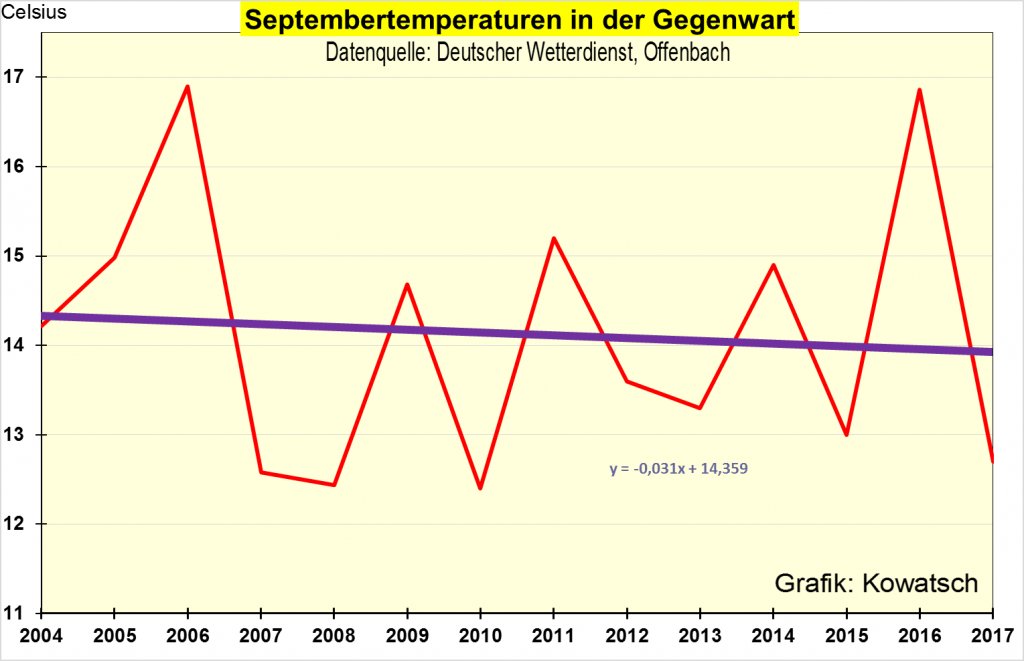Germany Temperatures Baffle: September Mean Shows Hardly Any Warming In 70 Years
By Josef Kowatsch and Dr. Sebastian Lüning
(Translated and edited by P Gosselin)
Temperatures are rising and rising and rising. That’s what we read in any case in the daily newspaper, and that’s what some television professors, activists and climate scientists are telling us. Strangely rarely are temperature curves ever shown. Why is this so? One example is the September mean temperature for Germany, which we use to illustrate this peculiar media documentation gap.
Here we use the official DWD German Weather Service data. When we look at the past 100 years we see a very modest warming of just a few tenths of a degree (Fig. 1). This is no surprise as we find ourselves in the warming phase since the Little Ice Age, the coldest phase of the last 10,000 years. It would have been terrible had the climate stayed at this non-representative low level.

Figure 1: Chart depicting Germany September mean temperature over the past 100 years. Data source: DWD.
It is easy to see the long cycles in the temperature curve. Above we a cold phase between 1920 and 1930, followed by a warm period during the Nazi time, and then followed by a long-term cold dip.
Beginning in 1985, September began to warm up again before reaching a plateau that took hold just before the year 2000 and at which we currently find ourselves. Based on the past development one could speculate that we are headed towards a slight cooling.
Now let’s look at the period from the end of WWII until today, more than 70 years, the time of the last temperature plateau until today. Immediately we see that we are far from worrisome climate warming (Fig. 2):

Figure 2: Chart depicting Germany September mean temperature over the past 70 years. Data source: DWD.
Finally we take a look at the past 13 years (Fig. 3), i.e. the development since 2004. Again there has not been any significant warming. In fact there’s been some cooling. Everything other than a climate catastrophe.

Figure 3: Chart of September mean temperatures in Germany over the past 13 years. Data source: DWD.
Getting back to the primary question of why isn’t the German media showing the real German temperature curve, obviously the real facts are just too inconvenient. A pert of the public could even lose its faith in the much-preached climate catastrophe and end up sharply criticizing the harsh sacrifices now being made because of the climate fear that has been instilled by policymakers.
It’s high time for the issue to be made transparent and to push back against the activism. What’s needed is a new environmental protection ethic, one which addresses all the problems.
The excessive focus on the climate question is no longer sustainable and is even counterproductive. Other more important problems that can be solved over the short term require greater attention — clean water, clean air and clean food being evenly distributed — would be a common ethical goal for mankind to strive for. The fear-mongering climate protection issue is a repeat of the earlier business model of sin and the sale of indulgences.





As there is near zero CO2 CS, it’s the result of lower tsi as we enter the new LIA.
It must be all those monuments to the glories of fossil fuels — Wind farms and Solar cells, that are keeping Germany anomalously cool.
Or maybe the global temperatures have not, and are not, rising as fast as we are lead to believe.
Or maybe Germany isn’t the globe and with a weather system that isn’t confined by country borders it’s kind of silly to infer the state of global warming from one little region in Central Europe?
BTW: the yearly average temperature in Germany increases pretty fast: https://www.dwd.de/DE/leistungen/zeitreihenundtrends/zeitreihenundtrends.html?nn=495662 (chose “Jahr” in the “Monat” dropdown)
seb,
YOUR inference (not mine), maybe the temperatures have NOT risen with so many ‘doctored’ temperature records.
tom0mason,
Annual temperature anomalies in Germany have indeed increased, but at a rate of 0.1 deg C per decade, not exactly ‘pretty fast’ as Bastian claimed. But hey, our friend wouldn’t dare exaggerate, would he?
All seems to be a bit ‘luke warm’ doesn’t it Sebastian?
Porridge in Slade?
I am glad to see seb that you must agree with me that Wind farms and Solar cells are monuments to the glories of fossil fuels, and all the industry that fossil fuel can provide. Or is that an inference too far for a snowflake?
Please tell us Seb, how are surface air temperatures ‘read’ on that massive area that consists of 4/5ths of the Earth’s surface, I mean the oceans, where no thermometers exist?
September was cool in Helvetia, too (1.6 deg. C under the 1981-2010 norm).
http://www.meteoschweiz.admin.ch/home/klima/gegenwart/klima-berichte.subpage.html/de/data/publications/2017/10/klimabulletin-september-2017.html
But it it silly to focus on September only; as our friend SebastianH points out, the best-fit linear trend since 1880 has been approx. 1.4 deg. over 137 y, or about 0.1 deg. C per decade. This is not “pretty fast”, however, not by IPCC standards.
For the observant, Business as Usual human emissions were supposed to have caused a global temperature increase of over 1 deg. C since the late 1980s. Sadly (for the ’cause’, the global mean surface temperature anomaly increase over the past 30 y has been less than half that. For Germany, it’s been about a third.
Yet human GHG emissions have risen about 1/3 more quickly than for the IPCC’s BAU scenario (2.0 % per annum vs the 1.5% per annum).
Time to go back to the drawing board.
Earth’s temperature cooled down by 4 C since the Holocene Climate Optimum of 8000 years ago.